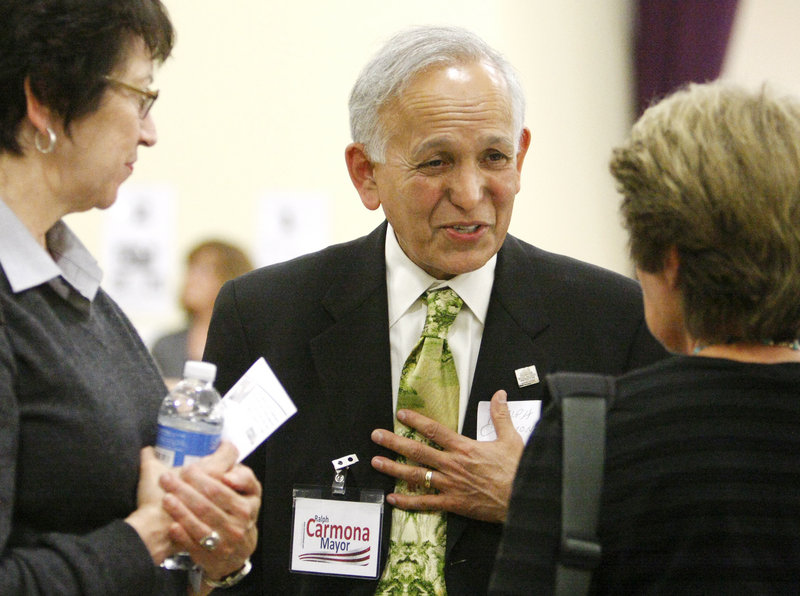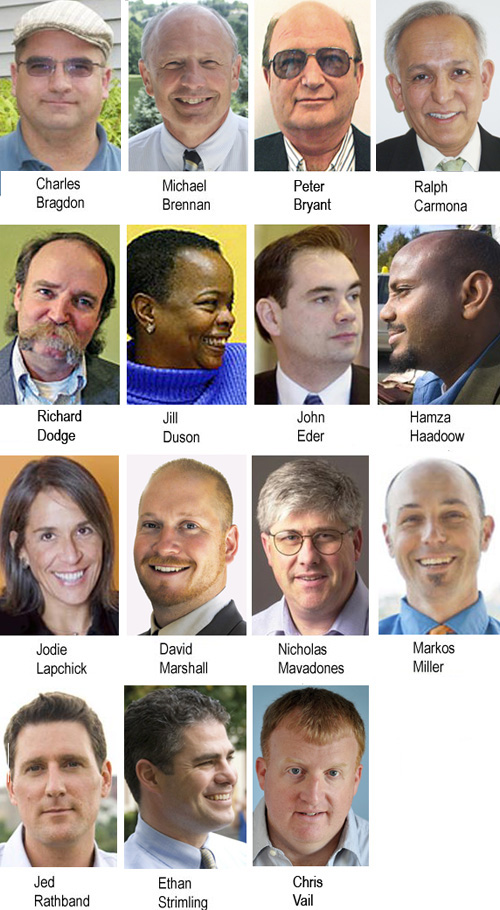PORTLAND – Organizers of the event described the format as “speed dating,” but for the city’s 15 mayoral candidates, Wednesday’s forum at the Ocean Avenue Elementary School probably felt more like the Spanish Inquisition.
“Do you know how much it costs to pave a road in Portland?” one man asked Michael Brennan.
“Can the new mayor really do all the things you guys are promising?” another man asked Markos Miller.
“What are the differences between what the mayor will do and what the city manager currently does?” a lady asked Jed Rathband.
Every five minutes, John Spritz of Portland Tomorrow, which organized the event, rang a dinner bell and a different group of residents came to each candidate’s table, armed with different questions.
At night’s end, Spritz asked candidates to sum up what they had learned.
“We have a lot of very intelligent people following the race,” said city councilor and current Mayor Nicholas Mavodones, echoing many of his fellow candidates’ sentiments.
About 150 residents turned out for Wednesday’s event, which was co-sponsored by the East Deering and Back Cove neighborhood associations, in addition to Portland Tomorrow.
Organizers gave each candidate two minutes to speak at the start of the night — some took significantly more — then the “speed dating” began.
Many candidates stuck to scripts they had laid out at previous events. The lone Republican, Richard Dodge, and former state Sen. Ethan Strimling said the city needs fewer regulations and nickel-and-dime fees, which are inhibiting development.
Both emphasized their work in the private sector — Strimling as CEO of LearningWorks and Dodge as a commercial real estate agent and owner of Sam’s Great Northern Lobster Bakes catering service — and cited the failed redevelopment of the Maine State Pier as evidence of City Hall getting in the way of development, instead of figuring out how to close a deal.
“If I went to my board of directors and said two people wanted to invest $100 million in my company, but I couldn’t make it work, they’d fire me,” Strimling told residents at his table.
Candidates David Marshall and Rathband continued to lay out very specific policy initiatives, which appears to be a key part of their campaign strategies.
Marshall talked about bringing street cars to downtown Portland, using a combination of Federal Highway Administration funds and a tax-increment financing district.
“The difference between street car systems and buses,” he said, “is people build around street car systems. And that can grow our population and tax base.”
Rathband proposed a revolving loan fund for Portland families to pay for their children’s education. He would get the initial money to pay for it, he told one resident, by taking a lump sum from the city’s general fund. It would then grow based on the interest the loans accumulated.
“Those are the types of things we as a council can institute to attract middle-class families,” Rathband said. “That’s how we can grow our population and tax base.”
Candidates Jill Duson, Jodie Lapchick and Charles Bragdon endorsed the city’s new economic development plan, which took 18 months to develop. It doesn’t make sense to develop a new one, they said, or in four years the city will just have more planning and no action.
A few candidates talked about the importance of personality in making the new position of popularly elected mayor successful.
Miller, a Spanish teacher who has worked as a community organizer in the Bayside and Munjoy Hill neighborhoods, told a resident that the mayor won’t have the power to change City Hall unilaterally.
“The mayor’s not going to be able to tell people, ‘We should do this,’ and it’ll get done,” Miller said. “We need someone who’s going to be able to build political support and consensus to get things done, and I’ve shown I can do that.”
Ralph Carmona spoke about “temperament” as a key to success. The candidate cited Earl Warren, who became chief justice of the U.S. Supreme Court even though he had never been a judge, and now is remembered as one of the best jurists.
Carmona said Warren kept two jars. One had nine pencils, one for each Supreme Court justice. The other was empty. Warren would take one pencil and put it in the empty jar, which signified his vote on a particular issue. And he would keep working with the other justices until he could put all of their pencils into the same jar as his own.
“That’s the type of temperament I would bring to the job,” Carmona said. “That’s what we need.”
Staff Writer Jason Singer can be contacted at 791-6437 or at:
jsinger@pressherald.com
Copy the Story Link
Send questions/comments to the editors.




Success. Please wait for the page to reload. If the page does not reload within 5 seconds, please refresh the page.
Enter your email and password to access comments.
Hi, to comment on stories you must . This profile is in addition to your subscription and website login.
Already have a commenting profile? .
Invalid username/password.
Please check your email to confirm and complete your registration.
Only subscribers are eligible to post comments. Please subscribe or login first for digital access. Here’s why.
Use the form below to reset your password. When you've submitted your account email, we will send an email with a reset code.